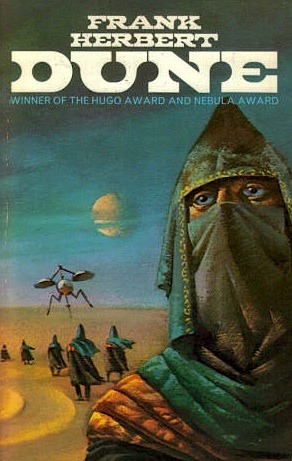|Fiction of Ideas| - Frank Herbert's "Dune" - Book Review

As it’s been pretty obvious
with my other sci-fi reviews, you will tell I am not the biggest fan of the
genre.
It’s not like I don’t want
to. It’s just a lot to process. Dune, for example, I really enjoyed. You can
just do so much endless world-building when it comes to science fiction. On a
broader sense, a writer can do so much. They can create different species,
different planets, different abilities for the characters, and even though that
is one of the greatest virtues of creativity in literary fiction, sometimes too
much world information is a lot for my brain to handle.
I took my time with Dune
and I was able to understand much of it, which made me really proud of myself.
Is it just me of Sci-fi names can be a little hard to remember sometimes?
Atreides(the good house), Harkonnen(The bad house), the Bene Gesserit(The women
that can see the future), Melange(The Spice). I had to actually write down all
of them and what they were to actually remember because if not I would’ve been
so confused and I wouldn’t have been able to know who is who or what is what.
The plot at hand is not
what’s complicated; the Emperor’s interest in more power and the demolition of
the House of Atreides and the expectance of a greater being who will make
Arrakis into a planet as rich as the Earth once was thousands of years ago...
that’s not what’s complicated.
What makes it complicated
is the overthought names, the different inhabitants of the planets, the
planets, the houses, the emperor and his minions and so on. Having to learn the
laws and the ideals of this dystopian world. THAT is what makes it a bit
challenging for me when it comes to reading science-fiction. Once again, it doesn’t
mean I don’t enjoy it. It just takes a lot more thinking that I don’t necessarily
want to do when I want to read a book for fun.
Anyway, I decided to give
it a try and Dune was actually very interesting. Paul Atreides was a great
protagonist and I was really rooting for him to be able to be strong enough to
beat the Emperor. I couldn’t care much for the trusted advisors of Leto
Atreides. But Paul I was really interested about. He grows from being born
under heavy secrecy to being the “Kwisatz Haderach” (The One) the people of
Arrakis have been waiting for.
The ending was the most
intriguing part to me. Yes, the Emperor succumbed and gave away his power, but
even when it seems as if there’s going to be a better future for this universe,
Paul doesn’t think so. Due to his ability of precognition, he is gifted and
cursed with knowing what is going to inevitably happen later on. How even his
power will not stop anyone from seeing him as nothing less than a God-like
being in comparison to anyone else.
I wasn’t expecting such
counteractive thoughts from this protagonist, but that makes me like him even
more. It makes him more human. Even though he’s gained more strength and
virtues, he still cares for his people and the future. A future with no issues
of power and dynamics.
This is one of those books
that unexpectedly gave me the hope to actually start reading more sci-fi books.
Good job, Mr. Herbert!
Comments
Post a Comment